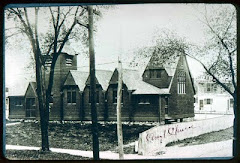Seminaries train theologians, not pastors. They teach hermeneutics, systematic theology, Biblical languages, church history...but with the exception of homiletics, there's little offered for many of the critical tasks pastors need to do regularly, to include:
-The Lord's Supper/Communion
-Baptism
-Weddings
-Anointing the sick
-Funerals
-the conduct of church/board meetings
Some seminaries hope their mentored ministry (apprentice) program will cover these matters, as the student works with local clergy. But there's no way of knowing for sure, unless the pastor maintains a thorough checklist of topics.
Case in point: the first funeral I ever attended, I conducted, and with absolutely no preparation. I literally made it up, and hoped what I was saying and doing was OK.
Hopefully the church will strive to do a better job of equipping future pastors to effectively serve God's people.
A La Carte (December 18)
4 hours ago







3 comments:
Interesting insight Pastor Bob.
Sounds like a lot of professional training is the same.
Lawyers don't get much in the way of "how to run a business".
But you make it look so easy ! lol
Kudos to you, Pastor, who is fully trained in theodicy. When I see the products of the "higher education" of our now, more than ever, secular universities, I see young men and women who are ill-equipped to deal with all the unjust suffering in the world. Our western way of life has been so good recently that suffering is no longer considered as a part of life, but an aberration that advocates atheism.
While I understand the desire to be better prepared for some of these "minor pastorial duties" I find you fully prepared to perform the primary duty of pastorship...to make an effective religious case for God and to help others put scripture in perspective.
foxhole-faith forever
There are advantages to seminary in a liturgical church tradition! At Episcopal Divinity School, I took two classes on liturgy, studying both the pastoral implications and doing hands-on practice of all those services you mention, as well as having to demonstrate my knowledge of liturgy with a section devoted to it in the General Ordination Exams! And that's even before you get the two years of field education in a church setting and one in a hospital setting, where I got to practice what I'd learned in class. By the time I graduated seminary, I had led worship more times than I could count, had officiated at a funeral, assisted at baptisms and communions aplenty, and had even taught others to anoint the sick and offer healing prayers. You know us Episcopalians: we consider it of paramount importance that liturgy be done "decently and in order," and as a result, it's a central part of the formal education of Episcopal priests. I'm quite grateful for it!
Post a Comment